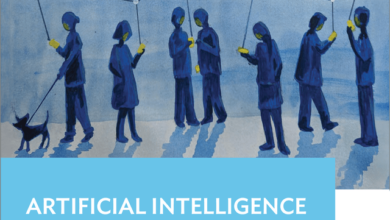Artificial intelligence could change our lives for the better
Amid the scare stories and dystopian visions, it is easy to forget two things. Firstly, that digital technology is not new and has been with us for a very long time. And secondly, that the advances in technology we are now witnessing offer previously undreamt-of solutions to shared problems, from medical science to the existential threat of climate change.
It is now the best part of half a century since the first user-friendly home computers started to appear. At that time, the advent of digital technology in the family home prompted a wave of angst and fear for the future, not entirely dissimilar to that we are living through with regards to AI. Digital pioneer Ken Olson was quoted in 1977 saying that “there is no reason for any individual to have a computer in his home”, such was the misunderstanding of how the future would unravel.
READ MORE
Artificial intelligence in focus at University of Glasgow
Some were extremely wary of the arrival of previously unknown technology in their living rooms and home offices. The tech-angst of earlier generations was such that, bizarre as it may seem now, in the early 1980s one Scottish MP went as far as to introduce a Bill to the House of Commons entitled “Control of Space Invaders and Other Electronic Games”, so great was the fear of such technology corrupting the minds of youth.
Amid the moral panic which clearly gripped some back then, few could have glimpsed the extent to which the computing power and rapidly accelerating technological sophistication, which some were so afraid of would, within a few short decades, bring benefits of a kind which now seem utterly commonplace.
How many would, in the mid-1980s for example, have predicted that by the early decades of the new century, we would all have access to devices which, effectively, carry every word ever committed to print while also serving as cameras, videorecorders, maps, phones and much more besides all sitting, literally, in the palm of our hands? The standard mobile phone now has over 4 million times the memory and well over 100,000 times the processing speed of the Apollo 11 guidance computer.
But the mystique of new technology still puts many people off rather than enthusing and engaging them with the possibilities at hand.
The reality is that every one of us uses and takes advantage of digital technology every day, whether it is booking a holiday, flight or train ticket, locating our exact position in an unfamiliar city, road or countryside or simply communicating with friends and family near and far.
Amid the blizzard of technological buzzwords and phrases – AI, virtual reality, the Internet of Things, Metaverse, Blockchain and many more – it is hard for many to grasp what these really mean and therefore the potential benefits that are available. The tendency is to switch off and disengage, despite almost every aspect of our daily life being dependent upon digital technology in one shape or another.
Concepts can appear to be overcomplicated or beyond our understanding, and yet the benefits, once demonstrated, are often understood immediately. The very best digital technologies are those which “just work” and therefore do not need an in-depth technical understanding. This is what could be called the “wow” moment, or the magic of digital. Apple has built its brand on the ‘user experience’. Where the technology is easy to use, society rapidly embraces it. When it goes wrong, the complaints queue very quickly forms (ask any IT department!) My own interests stem from early days of home computing. My career in aerospace, turbomachinery and energy has provided a diverse range of experiences where digital technology has been embraced, but also where it has been actively discouraged.
We all use AI every day already (Image: free)
My focus, and that of my team at the Net Zero Technology Centre, is to capture the rapid advances in digital technology to help deliver a net zero industrial future. NZTC is a not-for-profit organisation focussed on this global mission, assisting developers of prospective new technological applications by conducting field trials, commercialising concepts and accelerating growth in the drive to a carbon-free future.
As current political developments demonstrate very clearly, governments are finding it increasingly difficult to meet the climate change reduction targets they have set. Harnessing of technology offers previously unknown and untapped solutions to reaching that net zero goal. However making technology solutions that industry can readily adopt continues to be a challenge.
The rise of automation and digitalisation is frequently viewed as a negative because of its capacity to replace jobs. One of the key challenges to be embraced in that respect is not to focus on displacement. Every job will be influenced by, or change by, new advances whether technological or societal. What we do with the time that has been created for us by automation is the real question and this is often overlooked and undervalued.
AI and its associated applications need not, and will not, lead to a world without work, but it will change the way we work. Governments, business and academia can, by working together, drive forward that digital revolution, which Scotland has the capacity to be at the forefront of.
So, while we should always be wary of the challenges and risks posed by new digital technology, we cannot and must not allow that to frighten us from embracing the very real, tangible and transformational opportunities it promises. All digital technologies are based on human processes – they are just faster, repeatable, and able to be performed at a scale and complexity that is often ‘like magic’.
Graeme Booth is Head of Digital Technology, Net Zero Technology Centre. He is speaking at 10am tomorrow at the All-Energy Conference in Glasgow. His session Bringing the Digital and Energy Ecosystems Together



